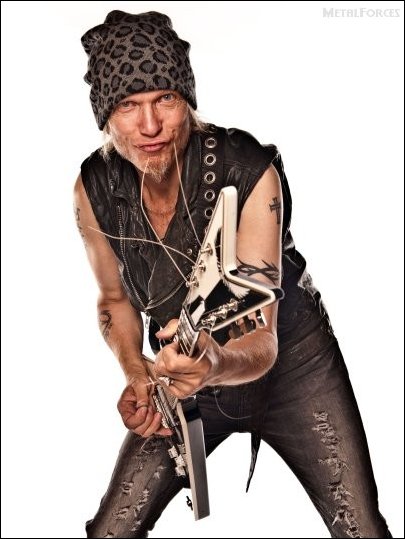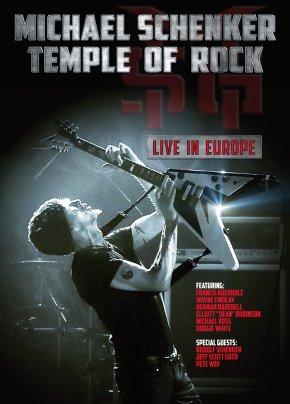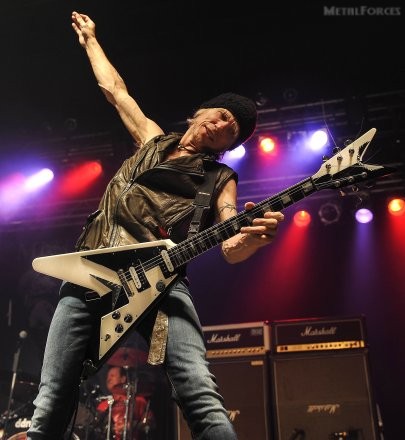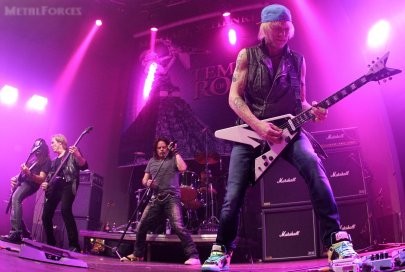
MICHAEL SCHENKER – Handmade Rock’s Architect
Anthony Morgan
January 2013

|
German axeman extraordinaire Michael Schenker (ex-UFO / ex-Scorpions) performed at the 013 in Tilburg, The Netherlands on May 13th, 2012, an outing taped for DVD issue. Surfacing courtesy of Temple Of Rock – Live In Europe, Schenker’s solo line-up on that specific date consisted of Schenker himself of course, Doogie White (ex-Rainbow / La Paz) supplying lead vocals, Wayne Findlay handling keyboards et al, and erstwhile Scorpions alumni Herman Rarebell and Francis Buchholz occupying drums and bass respectively.
“We had to go from Glasgow overnight to go there, and get ready to do the filming,” Michael chuckles. “It was a long way. We were filming, and there was a lot of stuff going on. Something that I notice with this particular line-up – with Herman and Francis – is that even in Germany and other countries, for the first few songs people would just look and look. They really watch everything, and then after a few songs they would start going crazy. That’s what also happened in Tilburg, but it happened not just in Tilburg. It happened everywhere with the exception of England. In England the people just go for it straight away, but in Europe it took a little while because I think they tried to figure out what this combination was all about.”
A number of factors caused Tilburg’s 013 to be a logical choice of venue. “You get one shot,” the axe-slinger notes. “You only have so much money you can afford to put together, and everybody who is involved is also an important issue in terms of where you do it. Everything had to make sense, and so in general this is what everybody came up with. The company that we used had done some filming at the venue before as well, so they were familiar with the technical aspects and stuff like that. That helped too, and so it was just a combination of many different things.”
Scorpions alumni comprised 60% of the overall member line-up on that very evening, if Michael’s presence is taken into account. “It’s a very unique line-up,” he enthuses. “I thought it would be great to capture this on DVD, because it may never happen again. Just incase something happens (laughs), I quickly captured it and so nothing can go wrong. I’m happy that I did, but at the same time we’re already making the next album. I think this line-up will be together for awhile but I recorded it anyway, because you never know.”
The assemblage of a touring line-up is determined by a number of variables. “When I finished Temple Of Rock (September 2011) I thought I had a band and a singer, but Michael Voss signed a solo deal,” the guitarist cites. “All of a sudden he wasn’t available so I had to figure out what to do, and that’s usually how it happens. I have to look what the situation is, and what I can do from there. Then I start being creative. I realised that Robin McAuley sang on the album, and also Doogie. Plus, a live show wouldn’t be able to have the original singers anyway because it was a summarised kind of set.
“The set was like a best of that involved different eras of my career that had different singers like Phil Mogg (UFO) and Gary Barden for example, so I wouldn’t have been able to have the original singers anyway. Because Doogie and Robin McAuley sing on this album too, I realised that I could ask Robin if he would be available to do this in America. He was available, and he wanted to do it. Of course, I’ve had many line-ups so I have many musicians to choose from. Doogie was available for Europe, and Michael Voss was available for Japan. I chose the musicians that at that time were also available and interested, and then based on availability I made my choices.”
As of September 19th, 2012, Robin McAuley was due to undergo surgery as the result of a hiatal hernia. “I don’t know if he’s had it yet,” Michael admits. “The last time I heard he was being tested, and he didn’t enjoy that. I’m not really sure. Nobody has reported to me yet that he has had it done. I don’t think he’s had it done yet, because otherwise people would’ve said something. I think he’s waiting for an appointment, and being tested.”

|
The axeman’s career spans across five decades, the man’s back catalogue a gargantuan affair. Selecting which tracks to perform in a live situation would arguably be a difficult task consequentially, but the German argues that this isn’t the case. “At this point in time it’s kind of easy, because I toured with Gary Barden for two to three years for In The Midst Of Beauty (May 2008),” he explains. “We played a lot of shows, and so because this is the best of Michael Schenker that involves different eras, I just decide to stick with stuff like the most popular albums to make it even more simple. I just focus on Strangers In The Night (UFO, January 1979), One Night At Budokan (February 1982), Lovedrive (Scorpions, February 1979), and then some songs from Francis’ and Herman’s stay with the Scorpions which are ‘Rock You Like A Hurricane’ (from March 1984’s Love At First Sting) and ‘Blackout’ (from the March 1982 album of the same name). You have a pretty good set together there.”
Material lifted from Temple Of Rock additionally features. “Temple Of Rock we are still touring, so sooner or later we will be adding things to the set,” Michael acknowledges. “We are actually already starting a new album which will be released by the end of 2013, so hopefully we will have something ready to perform on the next tour which starts in April. Everybody is putting their things together. I’m putting my things together, putting down my guitars. Basically from that moment on, it goes pretty quick. It’s with Doogie White, with that line-up. Doogie White, Herman Rarebell, Francis Buchholz, Wayne Findlay, and myself. It’s the same line-up as Tilburg.”
Temple Of Rock’s successor will inevitably adhere to a signature style. “It’s Michael Schenker,” the mainman laughs. “I’m being myself. When I write music, it’s Michael Schenker music because I’m creating on a whim. I don’t look around, and say ‘Oh, what shall I do today?’ I just express myself, and so what comes out is what comes out. I don’t have a description for that other than it’s what I do. It’s basically as much as possible pure self-expression. That’s what people tell me, that they can recognise my style. I wouldn’t know because I’m too deep in it, so… I don’t look at it that way anyway, but just based on what people say that’s what’s happening. I think when people focus on what’s within themselves – in other words, when people express themselves rather than trying to play something that somebody else has already expressed – automatically they will become original, because only you can express what’s inside you. You see what I mean? It’s natural that you’ll be very recognisable, because you’re the only one who does it.”
Doogie White’s involvement will somewhat flavour Michael’s forthcoming record as well, however. “When I’m writing of course, I have Doogie in my head because I know he’s gonna be doing the vocals,” he concedes. “He’s a more metal singer, and so automatically it will be more metal. It will be more on the level of ‘Before The Devil Knows You’re Dead’ (from Temple Of Rock) of course, because that’s Doogie singing there. Doogie has more of a heavy metal voice. Automatically, when I’ve been writing this time I’ve been writing with Doogie in my head, but I have a very good concept usually. When I wrote Temple Of Rock, I didn’t know what I was doing in the beginning. I just started and went for it, but this time I have a concept. I already know that the title of the album is gonna be Bridge The Gap, and so this time I have a blueprint in my head, like a map that I see. I can see that it’s a concept I have, and so I have a very clear direction of what I’m doing.”
The third stage of the axe-slinger’s career is distinguished by celebration. “What I’m doing at this point in time is celebrating the era of handmade rock,” he divulges. “I’m back in the loop to celebrate the era of handmade rock. Handmade rock is the rock that I fell in love with that started with Led Zeppelin, Deep Purple, and Black Sabbath. They created the foundation of what I call the era of handmade rock, and so handmade rock means it was done without computers and was just very straightforward. In the 70s bands like Rush, UFO, Scorpions, AC/DC and stuff like that created the framework of the foundation. In the 80s they were putting down the bricks and the clay to create that building, that temple, the era of handmade rock. Now we’re coming to the roofing, and the roofing is usually about celebrating.

|
“People these days with computers and stuff can write songs, and don’t even need to know how to play an instrument. There will be new eras though, and new temples will be created. People who’re growing up with computers are doing things in a different way, just like a 100 years ago people were riding wagons with horses and then 50 years later they weren’t doing that anymore – they were using cars. I want to celebrate the fact that it’s a special moment, a special era in evolution that cannot be repeated and will not be repeated. Life goes on with new toys to play with, and so this is a particular moment in time. When all of the people are gone that were the foundation of it, that era is just a memory.”
Albeit an architect of handmade rock, for recording purposes Michael uses modern studio equipment. “If you use a wagon and a horse and then a car becomes available, you change from the wagon and the horse to the car because that’s the new momentum of life,” he figures. “You cannot ignore it. It would silly to sit there on a horse and a cart while everybody is flying in rockets (laughs). What I’m saying is it was created by hand – rock was handmade – but while it was created, 40 years later new technologies are evolving and being used and of course you cannot ignore that. Life goes on, but I’m talking about the generation that are growing in an era where computers are already there. People who were born when cars were already around don’t even know what a wagon and a horse is. That’s what I’m talking about. It’s a particular era that new generations weren’t involved in, because they weren’t there. Therefore, the new generations are creating a new temple.”
February 1972’s Lonesome Crow – Scorpions’ debut full-length – marked the guitarist’s recording debut. “I wasn’t born in 2020,” he muses. “I was born when rock was handmade, so my generation is the era of handmade rock. That is where I come from. The first chapter was all about being in love with rock ’n’ roll, focusing on lead guitar and being fascinated with the single note. Pure self-expression, and excellence. That is what my focus was all the way up to the time of Strangers In The Night with UFO. My second chapter was about being more involved in experimenting, developing on a musical level and a personal level, growing and expressing, doing things at my own pace, overcoming certain aspects of life, and learning etcetera etcetera.
“I was growing in general, musically and personally. In the middle of life, you have challenges. You have to deal with problems, and you have to overcome certain aspects. You learn self-improvement, curiosity, finding out, discovering, making mistakes, falling flat on your face, and getting up and finding out why, what, and how. Those kinds of things. By moving forward and by dealing with those things, you grow, keep growing and understand more about life, and embrace the extra depths of life. You grow in directions where maybe some people are afraid to go in order to have a deeper understanding of life. That kind of stuff was fascinating for me, and that’s what I was enjoying. The third stage is I’m back playing rock ’n’ roll, and celebrating the roofing of the era of handmade rock.”
Slated for January 2013 issue, Paul Raymond Project record Terms & Conditions Apply will include a cover interpretation of The Four Tops tune ‘Reach Out (I’ll Be There)’ (the original rendition featured on July 1967’s Reach Out). Michael lends a guest appearance to the recording, him and Paul having being erstwhile bandmates in UFO. “Paul Raymond asked me if I could help him out,” he recalls. “I said ‘Yes, send me the thing.’ I put my guitar parts down on it in the studio with Michael Voss, and gave it to him. I haven’t heard the finished version of it yet.”
An acoustic collaboration between the axeman and vocalist Don Dokken (of heavy metal namesake Dokken) is in the works. “There is the Thank You (1993) album,” he reminds. “Don and I got together, and we had been talking awhile about doing something together. He likes the first Thank You album, so I said to him ‘Why don’t you put some vocals on it and see what happens?’ He did it on one song, and sent it to me. It was fantastic, so I said ‘Keep going. Let’s make this a project.’ I can’t wait to hear more.”

|
Whether the pair will record any original acoustic compositions is yet to be decided. “I don’t look that far ahead, so let’s see,” Michael reasons. “I’m more a person who likes to live in the moment. Right now that’s what Don is doing, so let’s focus on that first.”
Dean Guitars are currently crafting a fresh Michael Schenker signature guitar model for public release. “The Yin Yang was the latest but there is a new one coming, and that is gonna be for the next album,” the mainman reveals. I don’t know how soon it will be ready, but it’s something that goes with the concept that I’m using. People come up with ideas, and I just approve it. I tell them if it’s good, if I like it, so basically I handle quality control. It’s a reflection of my tastes. If I don’t like something, I say ‘You have to change this. I don’t like it.’ Everything about it reflects my tastes if I like it, and then it becomes a signature model.”
Further live performances are scheduled in support of Temple Of Rock, a United Kingdom trek beginning on April 9th, 2013 at Stockton On Tees’ ARC. A date at Norwich’s Waterfront on April 21st will conclude Michael’s visit to British shores. “I don’t know why, but in the UK they’re just happy right from the beginning,” he reiterates. “In Germany, Holland, and some other places, they just check you out for the first four to five songs. I don’t know why, but that’s what they do. A third into the set, they then start getting into it. I guess maybe they try to figure out what we’re gonna be doing. If it’s anything good and they like what they see, then they get into it.”
Pencilled for issue shortly is a personal VIP package, scheduled to include a previously unreleased 14-track demo recorded in 1979. “The demo is material recorded after I had finished with Scorpions,” the axe-slinger remembers. “I went into a mobile studio and recorded material for my first solo album (August 1980’s The Michael Schenker Group), which went through different stages. I rehearsed it with the Aerosmith guys (bassist Tom Hamilton and drummer Joey Kramer) and stuff like that, and I was singing on some of the material and so on. It’s stuff that nobody has actually ever heard, and has never been released. That’s part of the VIP package. Plus there’s the ‘Howler’, which is the tool that I’m using to get a particular sound. There will be an instructional DVD for it on how to use the tool, and plus the tool will be included. Then of course some other stuff that will be a part of the package. It’s a VIP package that will be sent out to people who order it.”
Temple Of Rock: Live In Europe was released in CD, DVD, Blu-ray and limited deluxe collector’s edition formats on December 10th, 2012 in Europe and subsequently on January 15th, 2013 in North America, all via inakustik.
Interview published in January 2013.
Related Posts via Categories
- SCOTTISH SICKNESS – A Report On The Scottish Death Metal Scene, Featuring BRAINBATH, PUTRID FATE And RANCID CADAVER (October 2022) | Features / Interviews @ Metal Forces
- LARVAE – Join The Hardcore Cult! (June 2022) | Features / Interviews @ Metal Forces Magazine
- TRENCH FOOT – Sacrificing Morals For Gory Obscenities (June 2022) | Features / Interviews @ Metal Forces Magazine
- L.A. GUNS – Trigger Happy (March 2019) | Features / Interviews @ Metal Forces Magazine
- CANCER – Crimes So Evil (November 2018) | Features / Interviews @ Metal Forces Magazine
- U.D.O. – The Tank Drives On (August 2018) | Features / Interviews @ Metal Forces Magazine
- SIEGE OF POWER – Bleeding For The Cause (August 2018) | Features / Interviews @ Metal Forces Magazine
- MOONSPELL – A Taste Of Live Eternity (August 2018) | Features / Interviews @ Metal Forces Magazine
- MONSTROSITY – Dark Matter Invocation (August 2018) | Features / Interviews @ Metal Forces Magazine
- SATAN – Five Magicians (August 2018) | Features / Interviews @ Metal Forces Magazine
|
|





